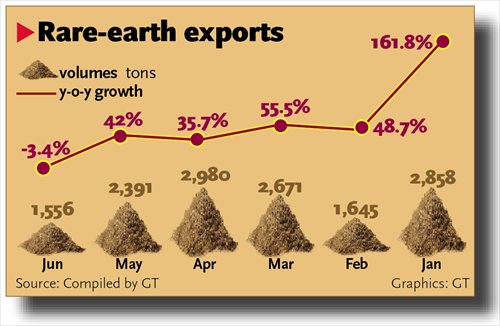 The 4th Chinese National Pole Dance Championship held in Tianjin
The 4th Chinese National Pole Dance Championship held in Tianjin
 Chinese navy commandos debut at 2014 RIMPAC
Chinese navy commandos debut at 2014 RIMPAC
 Guangxi impression: scenic countryside
Guangxi impression: scenic countryside
 World's largest aquatic insect found in Sichuan
World's largest aquatic insect found in Sichuan
 Ceremony volunteers for Youth Olympics make public appearance
Ceremony volunteers for Youth Olympics make public appearance
 A glimpse of female crew of Liaoning aircraft carrier
A glimpse of female crew of Liaoning aircraft carrier
 Stills from "Dad, where are we going?"
Stills from "Dad, where are we going?"
 Legless man's happy life
Legless man's happy life
 Top ten most beautiful islands in China
Top ten most beautiful islands in China
 Aerial view of Hong Kong
Aerial view of Hong Kong
 |
| (Graphics:GT) |
Govt to maintain export duties, quotas
China plans to produce 10 percent more rare-earth metals in 2014 than that in the previous year, an official with the Ministry of Industry and Information Technology (MIIT) said on Thursday, noting that the government will keep its policy of export duties and quotas in place.
The country's rare-earth metals extraction and production limit in 2014 is 10 percent higher than that of 2013, Huang Libin, an official at the MIIT, told a press conference on Thursday.
"The output cap was set after studying and analyzing the situation of the domestic and overseas market in recent years, and is jointly decided with the related government organs including the Ministry of Land and Resources," Huang said.
"The rapid development of China's strategic and emerging industries, especially the new material and energy-saving and environmental protection sectors, drove the demand for rare-earth metals, making it necessary to raise the growth target," Huang said.
The industry-wide consolidation campaign was aimed at creating six major rare-earth metal companies, said the official, noting the campaign has been going on since January resulting in rising demand.
"The country's economic growth in 2014 is forecast to be around 7.5 percent. That means overall demand still exists and the 10 percent growth target for the industry is within a reasonable range," Wu Chenhui, a nonferrous metal analyst with chinaiol.com, told the Global Times Thursday.
Rare-earth elements are a group of highly valued rare minerals used to make high-tech products from smartphones to hybrid cars and airplane equipment.
Wu said encouraging news about new-energy vehicles also stimulated the market of rare-earth metals.
President Xi Jinping said on May 24 that the new-energy vehicle sector should be given more importance in the future during a visit to Shanghai-based automaker SAIC Motor.
On July 13, five government agencies including the National Government Office Administration and the National Development and Reform Commission announced that new-energy vehicles must account for no less than 30 percent of all cars purchased by central government agencies and some city governments each year from 2014 to 2016.
Meanwhile, the State Council, China's cabinet, announced on July 9 that new-energy cars will be exempted from a 10 percent purchase tax starting from September in a bid to save energy and combat pollution.
"One type of rare-earth metal is used as material to make motors for electric cars," Wu said. "A growth in electric car consumption will augment the rare-earth market."
"The industry has been going through a process of consolidation, and the strategy to establish large industry players will naturally lead to greater demand for exploration of the resources," Xu Haibin, a metal analyst with Ji'nan-based commodity consultancy Sublime China Information, told the Global Times Thursday.
However, the consolidation process has been less smooth than expected, according to Wu.
"The process is not without setbacks. Local governments at provincial level tend to resist nationwide consolidation and prefer to create local giants," Wu noted.
Coupled with strong growth in the domestic market, exports of rare-earth metals have also expanded rapidly.
Customs data shows that China exported 14,101 tons of rare-earth metals in the first half of 2014, rising 49.9 percent from the same period in 2013.
China exported 22,493 tons of rare earth in 2013, or about 73 percent of the export quota allowed.
 Zhujiang ambassadors attend lotus lanterns activity
Zhujiang ambassadors attend lotus lanterns activity
 From girly girl to tough special police officer
From girly girl to tough special police officer
 Children attend gymnastics training in summer
Children attend gymnastics training in summer
 Beautiful sceneries along the special travel route in Xinjiang
Beautiful sceneries along the special travel route in Xinjiang
 Focus on 1st female patrol team in Turpan
Focus on 1st female patrol team in Turpan
 Collection of 'China Dream' public-spirited ads
Collection of 'China Dream' public-spirited ads  National fitness team members integrate traditional and modern beauty
National fitness team members integrate traditional and modern beauty Moms on their kid’s coming out
Moms on their kid’s coming out Chinese fighters through lens
Chinese fighters through lens
 48 hours after super Typhoon Rammasun
48 hours after super Typhoon Rammasun Bikini show held at water park in Xi'an
Bikini show held at water park in Xi'an
 Lobster vs cat: catch me if you can
Lobster vs cat: catch me if you can  Heat waves sweep China
Heat waves sweep China  Top 10 most beautiful islands in China
Top 10 most beautiful islands in China
 Zhou Xun announces engagement to Archie Gao
Zhou Xun announces engagement to Archie Gao
Day|Week|Month